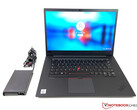Last month, Intel unveiled more Tiger Lake SKUs, including the Core i7-1195G7, a 28 W processor that can boost to 5 GHz. The company has since added two more Tiger Lake processors, the Core i5-11320H and the Core i7-11390H, both UP3 parts with 35 W TDPs. While the former debuted on Geekbench in May, it has taken until now for the Core i7-11390H to appear. You can find an overview of the Core i5-11320H and Core i7-11390H below.
| Intel Core i5-11320H | Intel Core i7-11390H | |
|---|---|---|
| Cores/Threads | 4/8 | 4/8 |
| Max Turbo Boost | 4.5 GHz | 5.0 GHz |
| Configurable TDP-up | 35 W | 35 W |
| Configurable TDP-up frequency | 3.2 GHz | 3.4 GHz |
| Configurable TDP-down | 28 W | 28 W |
| Configurable TDP-down frequency | 2.50 GHz | 2.90 GHz |
| Cache | 8 MB Intel Smart Cache | 12 MB Intel Smart Cache |
| GPU clock speed | 1.35 GHz | 1.40 GHz |
| GPU Execution Units | 96 | 96 |
Intel has not released any performance figures for either of its new 35 W Tiger Lake processors. However, Geekbench has offered some insights into the Core i7-11390H. On the face of it, the Core i7-11390H offers nominally better single-core performance than the Core i7-11375H, which also has a 5.0 GHz boost clock speed. The difference is only 2% though, so this is within a margin of error. Similarly, the Core i7-11390H lost out by under 1% in Geekbench's multi-core benchmark.
Additionally, it seems that the Core i7-11390H is also as fast as the Core i7-1195G7. The Core i7-11390H does outscore the AMD Ryzen 9 5900HS in single-core tasks, mind you. According to our database, the gap between the pair stands at almost 20%, although the Ryzen 9 5900HS holds a 30% advantage in the same multi-core benchmark. We should stress that one should not judge a processor on Geekbench alone, but the Core i7-11375H appears to offer almost all the performance that the Core i7-11390H does on first showing.
Source(s)
Geekbench via Leakbench & Videocardz, Intel (1) (2)


















